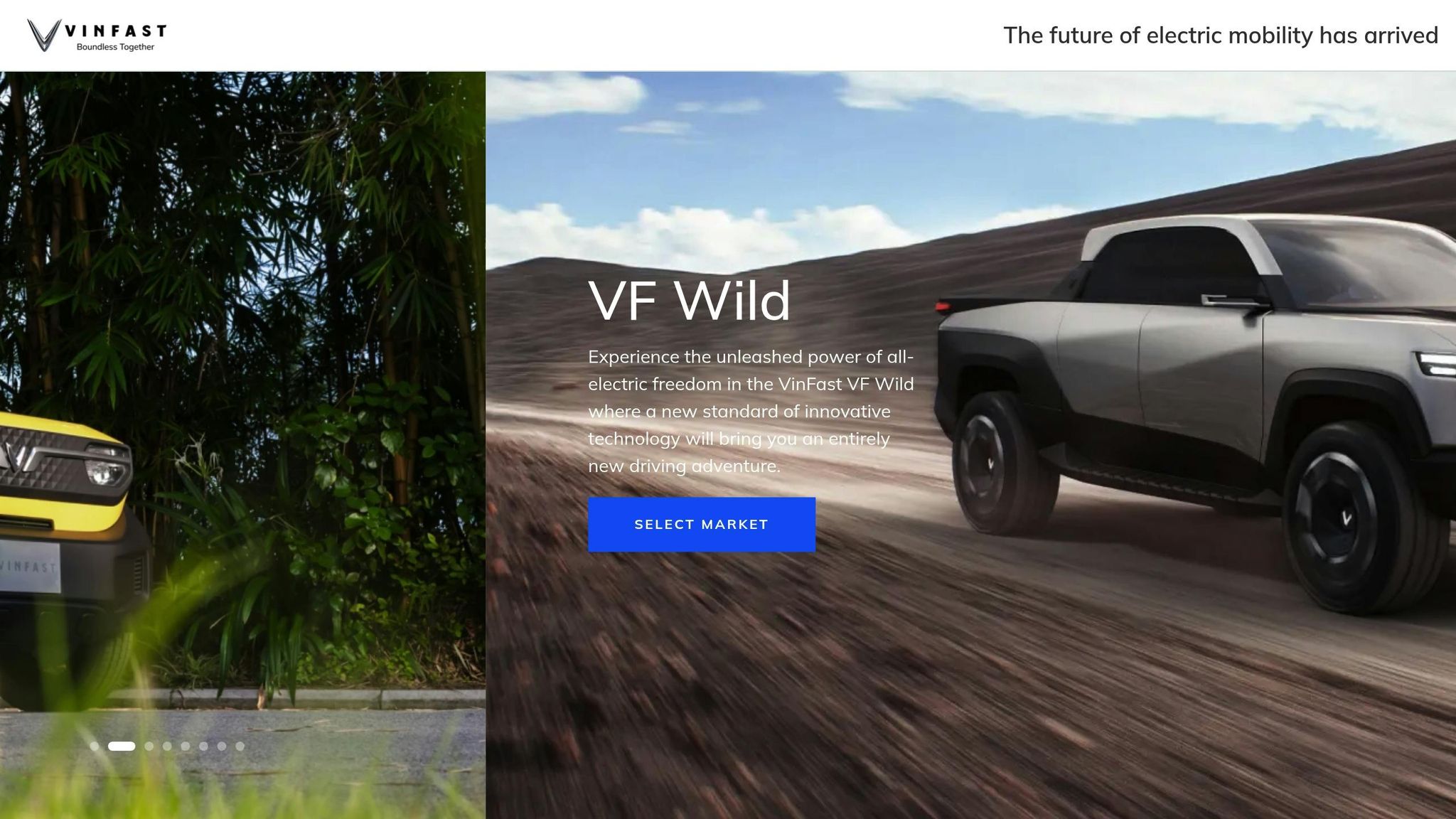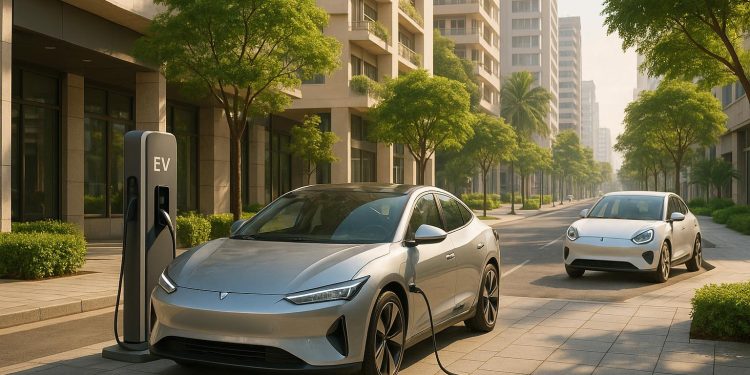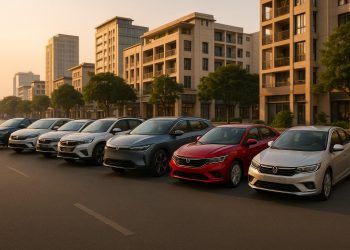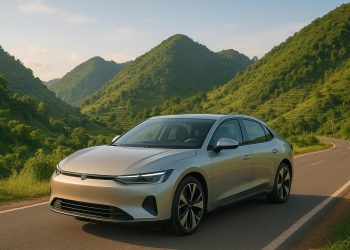Vietnam is witnessing a major shift toward electric vehicles (EVs) in 2025. Here’s why more drivers are making the switch:
- Market Growth: The EV market in Vietnam is valued at USD 3.12 billion in 2025 and is projected to reach USD 7.41 billion by 2030, with an annual growth rate of 18.88%.
- Government Support: Policies like tax cuts, fee waivers, and import duty reductions make EVs more affordable. For instance, EVs enjoy a 100% registration fee exemption until 2027 and reduced Special Consumption Tax rates.
- Lower Costs: Advances in battery technology and local production have reduced EV prices, while cheaper electricity and fewer maintenance needs lower long-term expenses.
- Charging Infrastructure: Cities like Hanoi and Ho Chi Minh City now have widespread fast-charging networks, addressing range concerns for both urban and long-distance travel.
- Consumer Demand: Rising fuel prices (around $6/gallon) and growing awareness of air quality issues are pushing drivers toward cleaner, cost-effective options.
Vietnam’s push for 1 million EVs on the road by 2030 reflects a clear commitment to cleaner transportation and a shift in consumer priorities.
Thị Trường Xe Việt 2025: Xe Điện “Lên Ngôi”, VinFast Chiếm Lĩnh Toàn Thị Phần!

Government Policies Drive EV Adoption
The Vietnamese government has taken bold steps to make electric vehicles (EVs) more accessible by introducing tax cuts, fee waivers, and production incentives. These initiatives have shifted EVs from being luxury products to practical, everyday transportation options. This policy-driven approach is setting the stage for further growth, aligned with advancements in technology and shifting consumer preferences.
Tax Cuts and Registration Fee Waivers
In March 2025, the government issued Decree No. 51/2025/ND-CP, extending the 100% registration fee exemption for battery-powered EVs until 28 February 2027. Without this extension, a 50% registration fee slated to take effect from 1 March 2025 could have slowed EV adoption.
"Vietnam has extended its 100 percent registration fee exemption for battery-powered electric vehicles (EVs) through 2027. The decision is set to further incentivise the green transitions among consumers and businesses."
Under the updated policy, EVs enjoy a full registration fee exemption for three years, followed by a 50% reduction for the subsequent two years. In contrast, petrol and diesel vehicles remain subject to full fees. Additionally, EVs with up to nine seats benefit from a reduced Special Consumption Tax (SCT) of just 3% until 28 February 2027, after which it rises to 11%. This is still significantly lower than the 35% to 150% SCT rates applied to conventional vehicles. The 2025 Special Consumption Tax Law also introduces favorable rates for alternative fuel vehicles: hybrid vehicles are taxed at 70% of petrol vehicle rates, while biofuel vehicles are taxed at 50%. On the production side, manufacturers gain from import tax exemptions on specialized equipment and materials used in clean energy vehicle projects.
Government Investment in Green Infrastructure
While tax and fee reductions make EVs more affordable for consumers, manufacturing incentives are lowering production costs and fostering sustainable industry growth. For example, Decree No. 199/2025/ND-CP, issued in July 2025, reduces import tariffs on completely knocked-down (CKD) parts. This decree allows automakers to combine production totals for green and conventional vehicles, which helps major players like VinFast and others reduce costs.
"Decree 199/2025/ND-CP marks a significant policy advancement in Vietnam’s vehicle sector transformation. By extending 0% import duties to components of green vehicles and easing minimum production criteria through aggregation provisions, the decree provides a powerful incentive for automakers to accelerate investment in electric, hybrid, and alternative-fuel vehicles."
Given that imported components account for 40–60% of vehicle production costs in Vietnam, eliminating tariffs significantly reduces overall expenses. This makes EVs more competitively priced and encourages further investments in local production facilities. These policy measures play a crucial role in Vietnam’s strategy to lead EV adoption across Southeast Asia.
EV Technology Becomes More Affordable
In Vietnam, the cost of owning an electric vehicle (EV) has dropped significantly, thanks to a mix of supportive government policies and advancements in technology. These developments have made EVs not just affordable, but also dependable for everyday use. With key improvements in their design and performance, EVs are now a practical choice for daily drivers.
Advancements in Battery Technology
Recent progress in lithium iron phosphate (LFP) battery systems has addressed many of the challenges associated with EVs. These batteries are built to perform well in Vietnam’s tropical climate, easing concerns about range and durability. With better energy density and faster charging capabilities, EVs are now equipped to handle both city commutes and longer journeys without frequent stops for recharging.
sbb-itb-1ccdff5
EV Charging Infrastructure Expands Rapidly
With electric vehicles (EVs) becoming more affordable in Vietnam, the expansion of charging infrastructure is making them an even more practical choice. The growing availability of charging stations nationwide is a major factor encouraging drivers to embrace EVs. Thanks to a mix of government funding and private sector collaborations, a comprehensive charging network is rapidly taking shape, addressing one of the biggest concerns for EV owners: range anxiety.
This surge in infrastructure ensures drivers have reliable charging options for both everyday commutes and long-distance travel. By strategically prioritizing areas with the greatest demand, the network is being built where it’s needed most. This groundwork also paves the way for advancements in fast-charging technologies and potential cost reductions.
Fast-Charging Networks in Major Cities
Cities like Hanoi, Ho Chi Minh City, and other urban hubs now boast a growing number of fast-charging stations as of 2025. Both government initiatives and private investments are fueling this growth, with smart grid and energy storage technologies being integrated to meet the increasing demand for EVs.
Conveniently located charging points – whether in shopping malls, office buildings, or residential areas – are making EV charging part of everyday life. On top of that, significant investments along major highways ensure seamless travel between cities, eliminating the stress of finding a charging station mid-journey. The use of smart grid technology also guarantees reliability, even during peak usage times.
Lower Charging Costs
The expansion of Vietnam’s charging network isn’t just about accessibility – it’s also making EV ownership more affordable. The government has introduced preferential electricity rates for public charging stations, which are passed on to consumers, helping to lower the cost of operating an EV.
In addition, Battery-as-a-Service (BaaS) platforms are easing the financial burden of EV ownership. By allowing drivers to lease batteries separately from their vehicles, these services reduce the upfront purchase cost while ensuring access to the latest battery technology. This innovative approach is reshaping affordability, making EVs a more attractive option for a broader range of consumers.
Consumers Show Greater Interest in Clean Transportation
With advancements in technology and expanding infrastructure, consumer demand is now steering the market in Vietnam. Drivers are increasingly prioritizing cleaner air and reduced fuel expenses, pushing the shift toward electric vehicles (EVs).
In Ho Chi Minh City, where gasoline costs roughly $6 per gallon and the average monthly salary hovers around $400, fuel expenses place a significant strain on household budgets. As Brandon Quach from Scholar Travel Stipend explains:
"Gas prices in HCMC are greater than what New Yorkers would pay – but in a country where the average salary is only $400 a month. Hence, it is clear why there is an enthusiastic move away from gasoline."
Changing Attitudes Toward Clean Air
Urban residents, particularly in major hubs like Hanoi and Ho Chi Minh City, are becoming more aware of how their transportation choices affect air quality. This growing awareness is shaping purchasing habits, with more consumers seeking out environmentally friendly options.
Government policies are also playing a crucial role in this shift. Hanoi’s plan to ban fossil fuel-powered motorcycles and mopeds within Ring Road 1 by 1st July 2026 highlights the national commitment to cleaner transportation. These policies align with the environmental and financial benefits of EVs, making them an increasingly appealing choice for consumers.
Long-term Cost Savings of EV Ownership
Electric vehicles offer clear financial advantages over time. They are less expensive to operate, as electricity costs less than gasoline, and their simpler design means fewer maintenance issues.
Government incentives further sweeten the deal. Registration fee exemptions and reduced tax rates make EVs a more affordable option compared to traditional vehicles.
"With escalating concerns over climate change, rising fuel costs, and mounting urban pollution, Vietnam has recognised the urgency of transitioning toward a low-emissions transportation system." – Invest in Vietnam
Together, these factors are driving the perception of EVs as not just environmentally responsible but also as a financially savvy choice. They provide a way to shield consumers from fluctuating fuel prices while contributing to cleaner, healthier urban environments.
Conclusion: Vietnam Leads EV Growth in Southeast Asia
Vietnam has emerged as a frontrunner in Southeast Asia’s transition to electric vehicles (EVs), thanks to a mix of forward-thinking policies, technological advancements, and a rapidly growing charging infrastructure. Government initiatives have played a key role in accelerating the shift toward cleaner transportation options.
Advances in battery technology and local manufacturing have significantly reduced costs, making EVs more accessible and practical. With longer driving ranges and lower price points, EVs have become a viable choice for many Vietnamese drivers.
The expansion of charging networks has also been a game-changer. Range anxiety is no longer a major concern, as drivers can now rely on well-distributed charging stations for both daily commutes and long-distance trips. Fast-charging options and reduced operating costs further add to the appeal.
Beyond infrastructure and technology, public perception has shifted. Many urban residents now view EVs not only as an eco-friendly option but also as a smart, cost-effective alternative to traditional vehicles.
FAQs
What is the Vietnamese government doing to encourage electric vehicle adoption in 2025?
The Vietnamese government is pushing forward with plans to boost electric vehicle (EV) adoption by 2025 through a range of supportive policies. Among these are registration fee exemptions for EVs until February 2027 and lower special consumption tax rates, making EV ownership more appealing. Public procurement policies now also favor EVs, and financial aid is available to help individuals and businesses make the switch to cleaner transport options.
On top of this, significant investments are being made to expand EV charging infrastructure, ensuring drivers can charge their vehicles conveniently. The government is also working to attract both foreign and local investments in EV manufacturing and related technologies. These initiatives aim to make EVs more affordable and accessible to Vietnamese drivers, while contributing to the country’s environmental goals and economic development.
How has battery technology improved to suit Vietnam’s climate and driving conditions?
Recent progress in EV battery technology is making electric vehicles a more appealing option for Vietnam, especially given the country’s tropical climate and varied road conditions. Today’s batteries are built to withstand high temperatures more effectively, minimizing the risk of overheating and maintaining steady performance – even during the scorching summer months when temperatures often climb above 35°C.
On top of that, modern batteries now charge faster and provide extended driving ranges, solving two major concerns: convenience and distance. This improvement makes EVs a practical choice for daily city commutes as well as longer journeys across Vietnam’s provinces. With the added benefit of an expanding network of charging stations, these advancements are encouraging more Vietnamese drivers to consider switching to EVs with greater ease and assurance.
How is the growing network of charging stations in cities like Hanoi and Ho Chi Minh City helping EV owners feel more confident about driving longer distances?
The growing network of charging stations in bustling cities like Hanoi and Ho Chi Minh City is helping to ease range anxiety for electric vehicle (EV) owners. With more charging points strategically placed across urban areas, EV drivers now find it much simpler to recharge their vehicles, making longer journeys more feasible and less worrisome.
On top of that, the introduction of fast-charging options means EV owners can recharge their cars in less time, adding a layer of convenience and efficiency. These advancements are playing a crucial role in motivating more Vietnamese drivers to explore EVs as a dependable and environmentally friendly way to get around.





